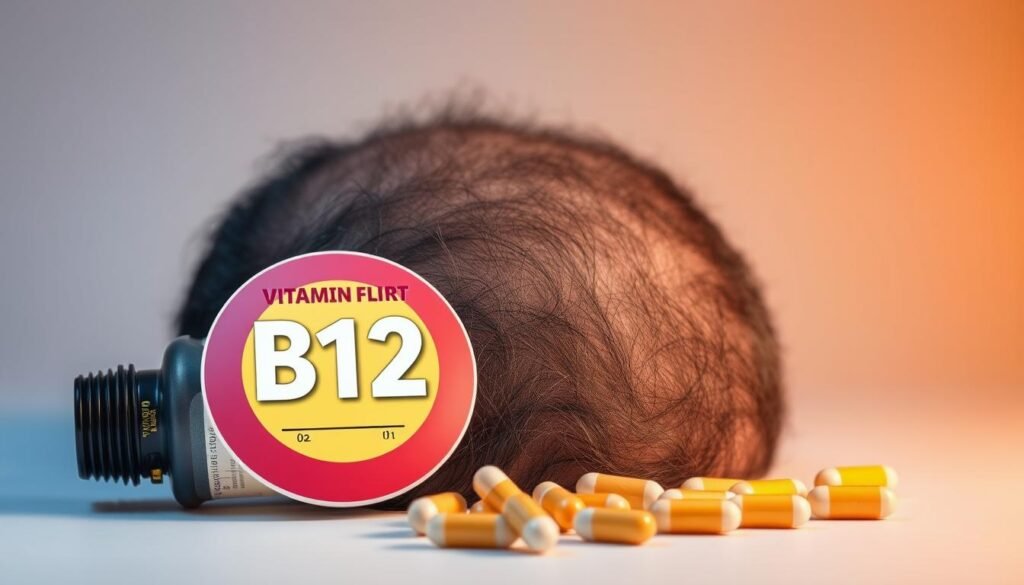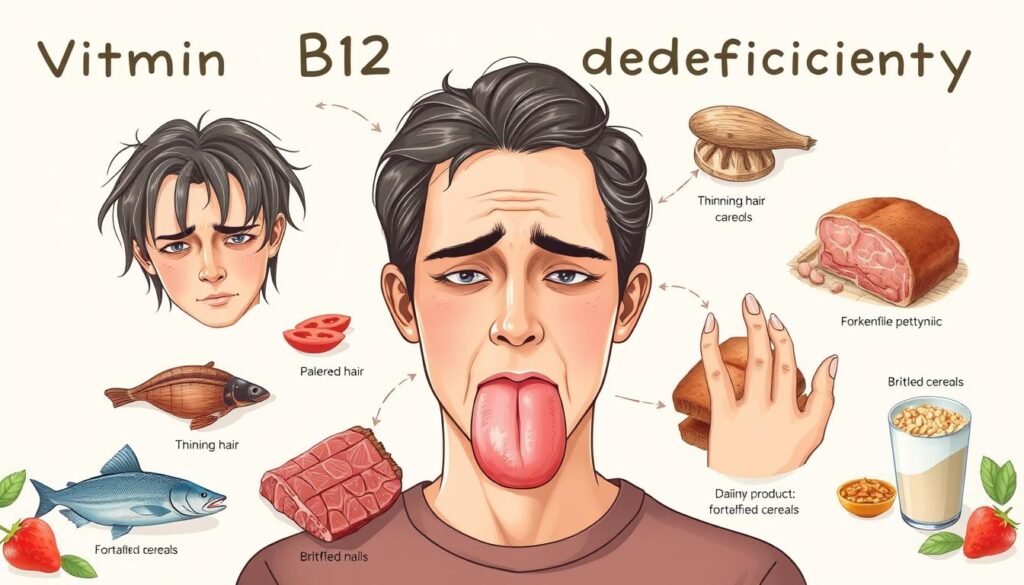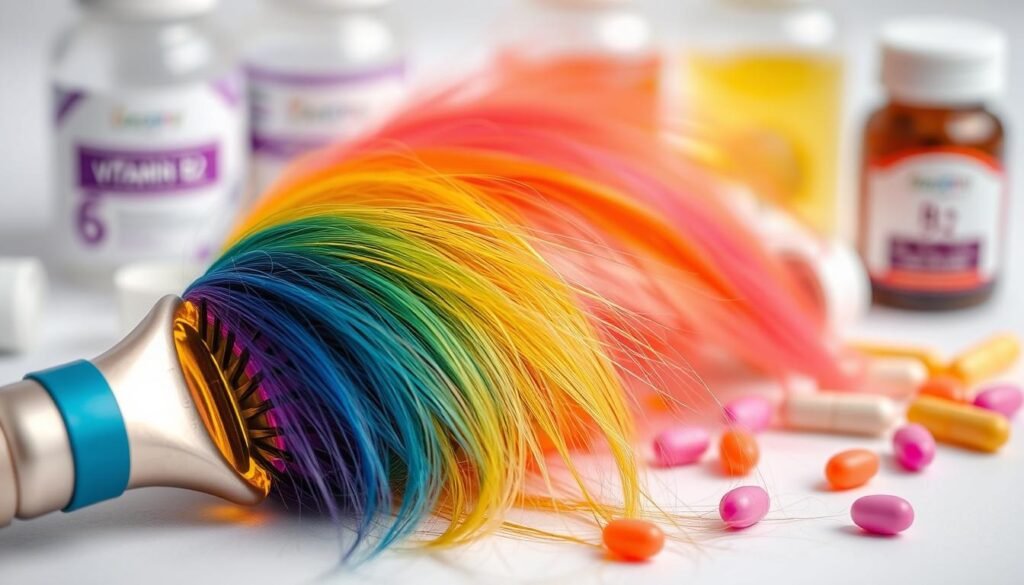About 20% of people with hair loss are low in vitamin B12. It’s surprising since we often think vitamin shortages are rare in well-off places. Yet, not having enough of certain nutrients can really affect hair health. This means problems like thinning hair, breakage, and losing hair.
This article looks at how not getting enough B12 is linked to losing hair. Knowing how B12 helps keep hair healthy is key. It lets people take steps to avoid hair loss due to not having enough nutrients. If you want to learn more, find additional details here.
Key Takeaways
- Vitamin B12 deficiency can lead to noticeable hair loss in a significant number of individuals.
- Understanding the role of vitamin B12 is crucial for maintaining healthy hair growth and preventing hair loss.
- Individuals at risk of vitamin B12 deficiency include those with dietary restrictions or absorption issues.
- Regular monitoring and dietary adjustments can help prevent vitamin B12 deficiency hair loss.
- Consulting healthcare professionals is important before making any substantial dietary changes or starting supplements.
Understanding Vitamin B12 and Its Role in the Body
Vitamin B12, known as cobalamin, is crucial. It comes mostly from meat, dairy, and eggs. B12 helps with many body processes like making DNA and red blood cells. It’s key for healthy nerves and overall well-being.
What is Vitamin B12?
Vitamin B12 is special in the B complex group because it supports many functions. It’s stored in the liver and is vital for metabolism, cell growth, and division. Without enough B12, cells cannot divide properly, which can lead to anemia. This shows why it’s important to have enough B12.
How Vitamin B12 Affects Cell Division and Growth
B12’s role in cell division is crucial, especially in the bone marrow where blood cells are made. Not getting enough B12 can slow down cell division. This affects various functions, including hair growth. Hair needs nutrients to grow, and B12 is key for this.
A lack of B12 might lead to hair loss. It’s vital to eat foods rich in B12 for healthy hair. For details on how nutrient shortages affect hair, look at this research article.
The Link Between Low B12 Levels and Hair Loss
Understanding how b12 levels and hair loss are connected helps us learn the importance of Vitamin B12 for our hair. This vitamin is key in keeping hair healthy by aiding cell functions vital for hair growth. Lack of enough Vitamin B12 can cause hair follicles to struggle, affecting hair health.
Why B12 is Essential for Healthy Hair Growth
Vitamin B12 is crucial for making red blood cells. These cells bring oxygen and nutrients to every part of the body, including the scalp. A good oxygen and nutrient supply helps b12 and hair growth, making hair strong. Not having enough Vitamin B12 can damage this process, hurting hair health.
Effects of B12 Deficiency on Hair Follicles
A Vitamin B12 shortage can harm hair follicles. Adults need 2.4 micrograms of B12 daily, with pregnant and breastfeeding women needing more. People who don’t get enough B12, like those on vegetarian or vegan diets, might see their hair get thin or fall out more. Without the right nutrients, hair follicles weaken, leading to hair loss and sometimes early greying.

Symptoms of Vitamin B12 Deficiency
Knowing the common b12 deficiency symptoms is key for your health. Vitamin B12 is vital for many body functions. Lack of it leads to symptoms like feeling tired, weak, and having pale skin. Worse cases see people experiencing tingles and trouble thinking.
Common Signs to Look Out For
Here are the symptoms of vitamin B12 deficiency:
- Fatigue and weakness
- Pale or jaundiced skin
- Tingling sensations in the extremities
- Cognitive disturbances and mood changes
- Heart palpitations and shortness of breath
Hair Loss Among Other Symptoms
Hair loss from B12 deficiency is often missed. Many think it’s just stress or getting older. But it shows as thinning hair or even getting gray early. Research links healthy hair to good vitamin B12 levels.
Catching these signs early is crucial. Quick action helps a lot. For tips on handling vitamin B12 deficiency, check out this useful link here.

| Symptoms | Description |
|---|---|
| Fatigue | Constant tiredness or lack of energy. |
| Pale Skin | Skin appears lighter due to lack of red blood cells. |
| Tingling Sensations | Unusual feelings in hands and feet, known as neuropathy. |
| Cognitive Changes | Memory lapses, mood swings, or difficulty concentrating. |
| Hair Loss | Thinning hair, texture changes, or unusual graying. |
Can B12 Cause Hair Loss?
Vitamin B12 and hair health are closely linked. Many understand that vitamins are crucial for overall well-being. Yet, the specific impact of b12 deficiency effects on hair is often overlooked. Not having enough B12 can interrupt how hair grows, leading to increased hair loss.
How B12 Deficiency Disrupts Normal Hair Growth
Vitamin B12 is key for cell division and growth, which are vital for hair follicles to work right. Low levels of B12 can harm these follicles, which may cause more hair to fall out. Many don’t connect hair loss with not having enough B12 early on. Catching and treating a deficiency early is important.

Research Findings on B12 and Hair Shedding
Studies show a clear connection between low B12 and losing hair. One study found nearly 39% of people had just enough B12 to avoid being low. This highlights why it’s important to watch your nutrition closely. Not having enough B12 can slow down making new hair because it’s involved in making DNA and red blood cells.
Keeping your B12 levels up can help keep your hair healthy. While some get enough B12 from food, others might need supplements. Taking extra B12 can be an option for them.
| Vitamin B12 Levels | Impact |
|---|---|
| Under 200 pg/mL | Indicates deficiency |
| 500 – 900 pg/mL | Normal levels |
| Recommended daily intake | 2.4 mcg |
| Potential therapeutic dose | Up to 1,000 mcg for deficiencies |
To learn more about how vitamins keep your hair healthy and prevent hair loss, read this detailed article on vitamins and hair health.
Diagnosing Vitamin B12 Deficiency
Doctors start to diagnose B12 deficiency with blood tests. The main test checks vitamin B12 levels in your blood. If levels are below 200 pg/mL, it often means there’s not enough B12.
Blood Tests and Their Importance
Blood tests are key to measuring B12 levels. Along with the B12 test, doctors do a complete blood count (CBC). This counts your red blood cells. A low count can signal B12 issues and prompt further action. Besides, tests might check for conditions that affect B12 uptake, like autoimmune issues.
Understanding CBC and Other Tests
The CBC and B12 tests give important health clues. A normal cell volume might mean red blood cells are okay despite low B12. Sometimes, the CBC shows signs of megaloblastic anemia, which means red blood cells are too big because of B12 shortage. If someone has nerve problems, more tests might be needed to see the full impact of B12 deficit.
Treating Vitamin B12 Deficiency
Effective treatment for Vitamin B12 deficiency combines diet changes and supplements. It’s crucial because B12 helps keep our hair healthy. First, we identify dietary sources of B12 to increase our intake.
Dietary Changes for Hair Growth
Adding B12-rich foods to your diet can improve hair health. Great options include:
- Canned tuna
- Rainbow trout
- Clams
- Haddock
- Dairy products
- Fortified cereals
If you don’t eat animal products, look for fortified foods or supplements. B12 mainly comes from animal sources, so supplements are important for vegans.
Role of B12 Shots and Oral Supplements
If your B12 deficiency is severe, B12 shots for hair loss might help quickly. Doctors may start with daily shots for two weeks. Then, they switch to less frequent doses based on your needs.
After shots, oral supplements help keep your B12 levels right. Having enough B12 is key to getting your hair to grow normally again.
Preventive Measures for Maintaining Healthy B12 Levels
It’s important to keep B12 levels healthy for our well-being. Checking levels often can spot issues early. This is key for people like vegans, vegetarians, and older folks. Knowing what to eat and making small changes can really help with B12.
Importance of Regular Monitoring
Checking B12 is key for those who might not absorb it well. This includes older people or those on certain meds. Getting blood tests regularly helps keep track of B12. This means any problems can be fixed quickly.
Foods Rich in Vitamin B12
Eating foods high in B12 is vital to avoid a shortage. Some top sources are:
- Animal Products: Lean meats, fish, eggs, and dairy.
- Fortified Foods: Some cereals, plant-based milks, and nutritional yeast.
- Supplements: B12 supplements are an option if you can’t get enough from food.
Making these diet changes can help keep you healthy. This helps avoid issues that come with not having enough B12.
B12 Supplements: Pros and Cons
Vitamin B12 supplements are getting popular for various health issues, including hair loss. It’s key to choose quality supplements for hair loss. This ensures you combat deficiencies and boost hair growth. Regular checks of vitamin B12 levels help maintain strong hair health.
Choosing the Right Supplement
There are different forms of B12 supplements like cyanocobalamin and methylcobalamin. Think about dosage, supplement form, and brand when choosing. A well-chosen supplement supports hair vitality. Always talk to a healthcare provider for advice suited to your health needs.
Potential Risks of Over-supplementation
Though vitamin B12 usually has low toxicity, the risks of taking too much are real. Too much B12 may cause imbalances and complications. Overdoing it can hide other health problems, leading to wrong diagnoses. It’s key to find the right dose since B12 is vital for blood cells and nerve functions. Balancing the benefits and risks is important.
| Supplement Form | Dosage Range (micrograms) | Efficacy | Notes |
|---|---|---|---|
| Cyanocobalamin | 500 – 1000 | Effective for most deficiencies within 1-3 months | Commonly found in oral supplements |
| Methylcobalamin | 500 – 1000 | Bioavailable; may work better for some individuals | Preferred for those with absorption issues |
| Injections | 1000 (or more, depending on the patient) | Quick relief for severe deficiencies | Administered by a healthcare professional |
Conclusion
Vitamin B12 is key for good health and especially helps keep hair strong. Its role in preventing hair loss shows why we need to pay attention to it. It’s vital for those with thinning hair to understand B12’s value and seek help early.
B12 deficiency is common, especially in older people and those who eat limited diets. This lack of B12 can lead to hair problems. It shows why eating right and regular check-ups matter.
To get enough B12, eat the right foods or take supplements. Always talk to doctors when trying to improve hair health. Healthy hair needs a mix of good nutrients, and knowing this is the first step to solving hair issues.